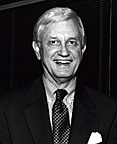May 18, 2007
Judge James L. Foreman Scholarship Reception, scholarship honor retired federal judge

Judge James Foreman
A reception announcing the establishment of the James L. Foreman Scholarship is set for 5 p.m., Monday, May 21, at the Southern Illinois University Carbondale law school courtroom. The scholarship honors Foreman, who retired May 12 as senior judge for the U.S. District Court for the Southern District of Illinois.
__________________________________________________________________________
Media Advisory
Reporters and photographers are welcome to attend the scholarship announcement and reception for Judge James L. Foreman at 5 p.m., Monday, May 21, in the SIU School of Law courtroom. For more information contact Alicia Ruiz, the law school's director of communications and outreach, at 618/536-7711.
__________________________________________________________________________
The school continues to receive gifts and pledges to further endow the scholarship, with more than $25,000 already raised, said Elizabeth Murphy, the law school's director of alumni affairs and annual giving. The scholarship will generate a minimum $1,000 annually for second- or third-year law school students with outstanding academic credentials who are from the 38 counties that comprise the Southern District of Illinois. Other specific scholarship criterion remains to be determined. The student will be recognized as the Judge James L. Foreman Scholar.
"We are pleased to honor Judge Foreman's many years of public service in this way," Dean Peter C. Alexander said. "This was driven largely by former law clerks, colleagues and friends of Judge Foreman."
Foreman, who turned 80 on Saturday, said he is "deeply flattered by the scholarship being in my name. I appreciate it very much."
During his 35 years on the federal bench, Foreman estimates he had about 25 law clerks working for him, and that 13 of them came from the SIU School of Law since 1976.
"I was always very pleased with the law clerks who came from SIU. They have done a great job for me," he said. "I have had law clerks from much larger law schools and the graduates from SIU are comparable to any other law schools."
Benton attorney Richard O. Hart is one of the scholarship committee members. Foreman has been "instrumental in promoting the law school" in hiring graduates as law clerks, and the scholarship is a way to honor him for his work, Hart said.
As a judge, Foreman was "very patient," but he also expected attorneys to be prepared when they came to court, Hart said.
"He has the demeanor," Hart said. "If you look for 'judge' in the dictionary you would find his picture there. He is one who exemplifies what a judge would look like and act like. He is a true Southern gentleman."
Foreman's contributions to the federal court in Southern Illinois are "immense," said federal Judge J. Phil Gilbert, who succeeded Foreman as district judge in 1992 and a year later as chief judge. Foreman "laid the groundwork" for the growth of the federal court in the Southern District of Illinois, said Gilbert, who calls Foreman the "father of the Southern District of Illinois."
Shortly after becoming chief judge in 1978, Foreman prevailed upon federal lawmakers to reconfigure the Southern District of Illinois so residents from as far away as Kankakee did not have to travel to Benton or East St. Louis.
Foreman is also responsible for the courthouse in Benton and an upgrade of the courthouse in East St. Louis, Gilbert said.
"He took this district from a 'mom and pop' federal court to a court system that has four active judges, three magistrate judges, and bankruptcy courts in East St. Louis, Benton and Alton,' Gilbert said. "All of us in Southern Illinois owe a deep sense of gratitude to this man."
One of Foreman's proudest accomplishments is that the Benton court facility is a full-time facility, which also includes the U.S. Attorney's Office, federal public defender's office and a bankruptcy court. That saves people from traveling to East St. Louis for court, he said.
When Foreman started on the federal bench in 1972, Benton was an outpost, he said. Court sessions there lasted about two weeks and required bringing an entourage of people, including Foreman's staff — a court reporter, U.S. marshal, probation officer and court clerk.
Carbondale attorney Shari R. Rhode, who appeared before Foreman on numerous occasions for more than 30 years, said she hopes students learn from the civility Foreman always demonstrated in court.
"He always had the civility and decorum I always think is appropriate to the federal courts," said Rhode, another scholarship committee member.
The scholarship recognizes Foreman's many years of service and the influence he had in terms of cases he handled, Rhode said.
"There are not many people who have been on the bench that long and had that breadth of influence," she said.
A 1998 article in the Chicago Daily Law Bulletin credits Foreman with instituting a case-management system for pretrial discovery schedules and mandatory settlement conferences in 1985 — five years before the Civil Justice Reform Act required case-management programs for all federal courts.
A Massac County state's attorney from 1960 to 1964, Foreman was also in private practice from 1952 to 1972. President Richard M. Nixon nominated him to the bench in 1972. He became chief judge in 1979, and took senior status in 1992.
A Metropolis native, Foreman earned his bachelor's degree in commerce from the University of Illinois in 1950, and his law degree from the University of Illinois College of Law in 1952.
Foreman and his wife, Mabel, live in Paducah. The couple has three daughters.
